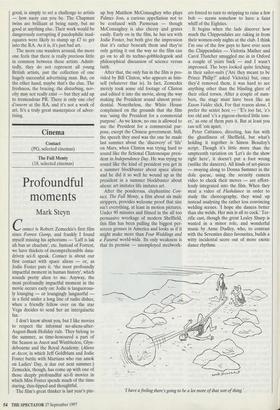Cinema
Contact
(PG, selected cinemas)
The Full Monty (18, selected cinemas)
Profoundful moments
Mark Steyn
Contact is Robert Zemeckis's first film since Forrest Gump, and frankly I found myself missing his aphorisms — Taff is lak uh bux uv chucluts', etc. Instead of Forrest, we have thickets of incomprehensible data- driven sci-fi speak. Contact is about our first contact with space aliens — or, as Jodie Foster puts it, 'the most profoundly impactful moment in human history', which sounds pretty alien to me. Anyway, the most profoundly impactful moment in the movie occurs early on: Jodie is languorous- ly lounging — or loungingly languorful in a field under a long line of radio dishes, when a friendly fellow over on the star Vega decides to send her an intergalactic fax.
I don't know about you, but I like movies to respect the informal no-aliens-after- August-Bank-Holiday rule. They belong to the summer, as time-honoured a part of the Season as Ascot and Wimbledon, Glyn- debourne and the Royal Academy. (Aliens at Ascot, in which Jeff Goldblum and Jodie Foster battle with Martians who run amok on Ladies' Day, is due out next summer.) Zemeckis, though, has come up with one of those deeply profoundful sci-fi movies in which Miss Foster spends much of the time staring, thin-lipped and thoughtful.
The film's great thinker is last year's pin- up boy Matthew McConaughey who plays Palmer Joss, a curious appellation not to be confused with Parmesan — though McConaughey is also cheesy and grates easily. Early on in the film, he has sex with Jodie Foster, but both give the impression that it's rather beneath them and they're only getting it out the way so the film can go on to all its techno-gobbledegook and philosophical discussion of science versus faith.
After that, the only fun in the film is pro- vided by Bill Clinton, who appears as him- self (whatever that is). In fact, Zemeckis merely took some old footage of Clinton and edited it into the movie, along the way making the President sound almost presi- dential. Nonetheless, the White House complained on the grounds that the film was 'using the President for a commercial purpose'. As we know, no one is allowed to use the President for a commercial pur- pose, except the Chinese government. Still, the speech they used was the one he made last summer about the 'discovery' of 'life' on Mars, when Clinton was trying hard to sound like the fictional Clintonesque presi- dent in Independence Day. He was trying to sound like the kind of president you get in a summer blockbuster about space aliens and he did it so well he wound up as the president in a summer blockbuster about aliens: art imitates life imitates art.
After the ponderous, elephantine Con- tact, The Full Monty, a film about six male strippers, provides welcome proof that size isn't everything, at least in motion pictures. Under 90 minutes and filmed in the all too persuasive wreckage of modern Sheffield, this film has been pulling the biggest per- screen grosses in America and looks as if it might make more than Four Weddings and a Funeral world-wide. Its only weakness is that its premise — unemployed steelwork- ers forced to turn to stripping to raise a few bob — seems somehow to have a faint whiff of the Eighties.
It begins when the lads discover how much the Chippendales are raking in from their women-only nights at the club. I think I'm one of the few guys to have ever seen the Chippendales — Victoria Mather and Carol Thatcher smuggled me in in Oxford a couple of years back — and I wasn't impressed. The boys looked quite fetching in their sailor-suits (Are they meant to be Prince Philip?' asked Victoria) but, once they'd removed them, it was hard to see anything other than the blinding glare of their oiled torsos. After a couple of num- bers, the stage must have been like an Exxon Valdez slick. For that reason alone, I prefer the sextet here — "E's too fat, 'e's too old and 'e's a pigeon-chested little toss- er,' as one of them puts it. But at least you can tell 'em apart.
Peter Cattaneo, directing, has fun with the ghastliness of Sheffield, but what's holding it together is Simon Beaufoy's script. Though it's little more than the umpteenth variation on 'Let's do the show right here', it doesn't put a foot wrong (unlike the dancers). All kinds of set-pieces — swaying along to Donna Summer in the dole queue, using the security camera video to check their moves — are effort- lessly integrated into the film. When they steal a video of Flashdance in order to study the choreography, they wind up instead analysing the rather less convincing welding scenes. 'I hope she dances better than she welds. Her mix is all to cock.' Ter- rific cast, though the great Lesley Sharp is wasted in a minor role, and wonderful music by Anne Dudley, who, to contrast with the Seventies disco favourites, builds a witty incidental score out of more exotic dance rhythms.
'I have a feeling there's going to be a lot more of that sort of thing.'










































































 Previous page
Previous page